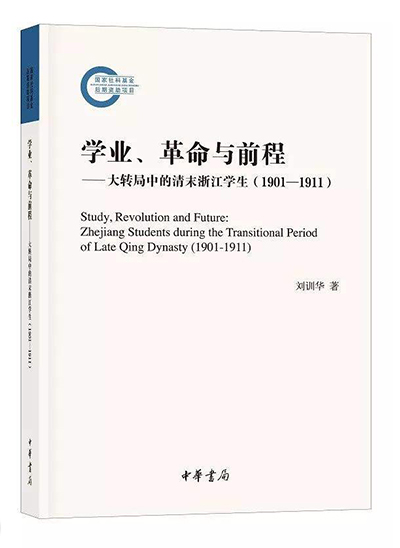Locating late Qing students in great social change

Study, Revolution and Future: Zhejiang Students During the Transitional Period of Late Qing Dynasty (1901–1911)
The period from 1901 to 1911, the last decade of the Qing Dynasty (1644–1911), was the historical stage that marked the collapse of the imperial system in China. During this period, education systems also underwent major transformations, and modern students began to emerge in China and gradually increased their influence.
In his book Study, Revolution and Future: Zhejiang Students During the Transitional Period of Late Qing Dynasty (1901–1911), Liu Xunhua, an associate professor from the College of Teacher Education at Ningbo University, focuses on students in Zhejiang Province during the transitional period of the late Qing from the perspective of the history of everyday life. He systematically analyzes the interaction among students, the education they received and social change.
The book involves the theory of the history of student life, the order of local education, the formation of modern student groups, modern school lives, and the thinking and study of overseas Chinese students. It attempts to explore historical changes in the late Qing from a unique perspective, based on quantitative and qualitative analysis of 154 modern students from Zhejiang Province.
When shifting his research focus from educational thought and educational systems to educational activities, the author stresses that student activities are an important field in educational history, especially in modern educational history.
Education itself is intended to help students develop fully and comprehensively. The author’s focus on students and their educational activities in the late Qing displays his “student-centered” philosophy in educational research. He re-divides the traditional “four-occupation society” of scholars, farmers, artisans and merchants into a “five-group society” of scholars, farmers, artisans, merchants and students. Compared with the traditional scholar category, students during times of great social change were naturally dissatisfied with previous eras and eager to absorb new knowledge. They quickly adapted to a series of new changes and measures imposed on them, forming a powerful force driving social development.
Experiencing profound changes unseen in millennia and facing an uncertain future, China during the late Qing era was totally different from the past. Revolution was irreversible. People had to make hard choices at an exploratory stage, for example, a change from advocating “learn barbarian (Western) methods to combat barbarian threats” to advocating “Chinese learning as the fundamental structure, Western learning for practical use.” Such guiding principles, however, were the result of passive choice in a transitional society, with inherently incompatible contradictions. These educational initiatives strived to cultivate talent with a new structure of competence yet a strong inclination to safeguard imperial power, causing conflict between the due purpose of education and its actual purpose.
Li Zhong is a professor from the School of Education at Shaanxi Normal University.
edited by YANG LANLAN
